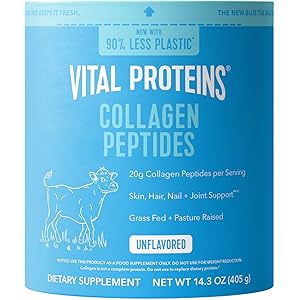Vital Proteins Collagen Peptides Powder - Grass Fed Collagen Peptides for Hair, Nail, Skin, Bone & Joint Health, Unflavored, 14.3oz
$23.79 (as of October 27, 2025 06:27 GMT +00:00 - More infoProduct prices and availability are accurate as of the date/time indicated and are subject to change. Any price and availability information displayed on [relevant Amazon Site(s), as applicable] at the time of purchase will apply to the purchase of this product.)What is a Raw Food Diet?
A raw food diet is a dietary regimen that emphasizes the consumption of unprocessed, uncooked foods. This lifestyle is based on the belief that cooking food can destroy its natural enzymes and nutrients, which are essential for optimal health. Advocates of this diet often consume fruits, vegetables, nuts, seeds, and sprouted grains, all in their natural state. The raw food diet is not just about eating raw fruits and vegetables; it also includes a variety of dishes prepared without heat, such as smoothies, salads, and dehydrated snacks.
History of Raw Food Diets
The concept of eating raw foods dates back to ancient civilizations, where people primarily consumed fresh, unprocessed foods. In the early 20th century, the raw food movement gained momentum with the publication of various health-related books promoting the benefits of raw diets. Pioneers like Maximilian Bircher-Brenner, who created the famous Bircher Müesli, advocated for raw foods as a means to improve health and vitality. Over the decades, the raw food diet has evolved, incorporating modern techniques and recipes while remaining true to its core principles.
Health Benefits of a Raw Food Diet
Proponents of a raw food diet claim numerous health benefits, including weight loss, improved digestion, increased energy levels, and enhanced overall well-being. Raw foods are typically low in calories and high in fiber, which can aid in weight management. Additionally, the abundance of vitamins, minerals, and antioxidants found in raw fruits and vegetables may contribute to better immune function and reduced risk of chronic diseases. Many people report feeling more energized and alert after adopting a raw food diet, attributing this to the high nutrient content of their meals.
Types of Raw Food Diets
There are several variations of raw food diets, each with its own set of guidelines. Some individuals follow a strict raw vegan diet, which excludes all animal products, while others may incorporate raw dairy or fish. Another popular approach is the raw omnivore diet, which includes raw meats and fish alongside fruits and vegetables. Additionally, some people may practice a raw food diet part-time, known as “raw till four,” where they consume raw foods during the day and cooked meals in the evening. This flexibility allows individuals to tailor their diets to their preferences and lifestyles.
Common Foods in a Raw Food Diet
The raw food diet is rich in a variety of foods that are nutrient-dense and flavorful. Common staples include fresh fruits like apples, bananas, and berries, as well as vegetables such as leafy greens, cucumbers, and bell peppers. Nuts and seeds, including almonds, walnuts, and chia seeds, provide healthy fats and protein. Sprouted grains like quinoa and buckwheat are also popular choices. Many raw food enthusiasts enjoy creating dishes using dehydrated ingredients, such as raw crackers and energy bars, which offer a satisfying crunch without the need for cooking.
Challenges of a Raw Food Diet
While the raw food diet offers many benefits, it also presents certain challenges. One of the main difficulties is ensuring a balanced intake of nutrients, as some essential vitamins and minerals may be less available in raw foods. For instance, vitamin B12, iron, and omega-3 fatty acids are typically found in animal products, making it crucial for raw vegans to seek alternative sources or supplements. Additionally, the diet can be time-consuming, as preparing raw meals often requires more planning and effort than simply cooking. Social situations can also pose challenges, as dining out or attending gatherings may limit food options.
Raw Food Diet and Detoxification
Many advocates of the raw food diet believe that it can aid in detoxification, helping the body eliminate toxins and impurities. The high fiber content of raw foods promotes healthy digestion and regular bowel movements, which are essential for detoxification. Some raw food enthusiasts engage in short-term detox programs that involve consuming only raw foods for a specific period. However, it’s important to approach detoxification with caution, as extreme diets can lead to nutrient deficiencies and other health issues if not properly managed.
Preparing Raw Food Meals
Preparing meals on a raw food diet can be both creative and enjoyable. Many raw food enthusiasts use tools like blenders, food processors, and dehydrators to create a variety of dishes. Smoothies, salads, and raw soups are popular choices for breakfast and lunch, while dehydrated snacks and energy bars make for convenient on-the-go options. Additionally, raw food recipes often incorporate herbs and spices to enhance flavor, allowing individuals to enjoy a diverse range of tastes while adhering to their dietary principles.
Conclusion: Is a Raw Food Diet Right for You?
Deciding whether a raw food diet is suitable for you depends on your individual health goals, preferences, and lifestyle. While many people experience positive changes after adopting this diet, it’s essential to consider your nutritional needs and consult with a healthcare professional before making significant dietary changes. A raw food diet can be a rewarding journey towards better health, but it requires careful planning and commitment to ensure a balanced and enjoyable eating experience.


